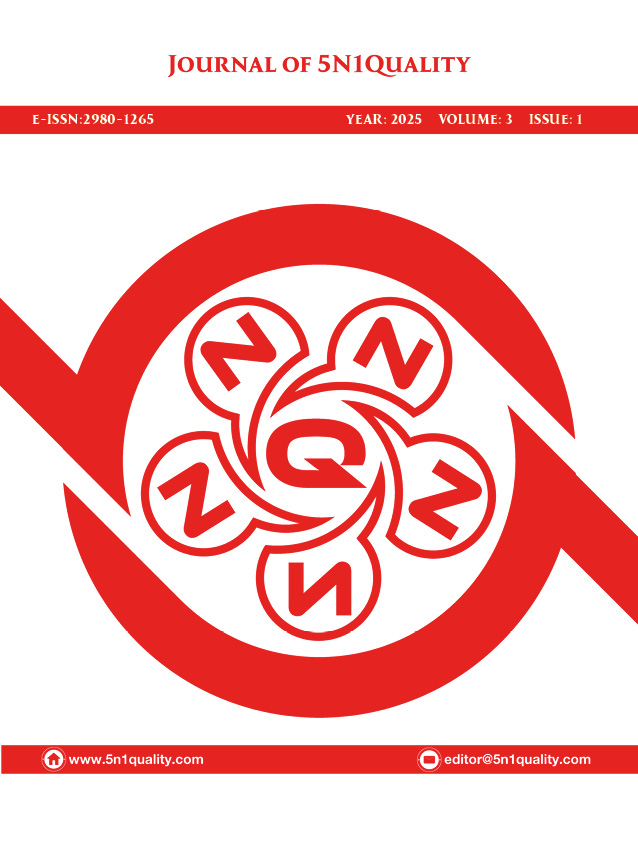Examining the Relationship Between Organizational Justice Perceptions and Demographic Characteristics of Healthcare Workers: A Descriptive Study
Organizational Justice and Demographic Characteristics in Healthcare Workers
DOI:
https://doi.org/10.5281/zenodo.15242006Keywords:
Organizational Justice, Healthcare Workers, Perception, Hospital ManagementAbstract
This study examined the organizational justice perceptions of healthcare professionals and the relationship between this perception and demographic variables such as gender, age, marital status, educational status, profession and length of service. The research was conducted with the participation of 372 public personnel working in Başakşehir Çam and Sakura City Hospital between 01.02.2024 and 01.08.2024. The data were collected through online forms and obtained using the "Personal Information Form" and "Organizational Justice Scale". R 4.4.2 and SPSS 25.0 programs were used in the analyses. 68.82% of the participants were female, 69.89% were between the ages of 21-30, and the majority were bachelor's graduates (62.63%). Nurses (40.32%) constitute the largest occupational group. It was found that procedural, distribution and general organizational justice scores were low. It was determined that interactional justice scores were significantly higher in the 31-40 age group, married individuals, doctoral graduates and physicians (p < 0.001). The research results reveal that the perception of organizational justice varies according to demographic factors and that individualized, justice-oriented management approaches should be developed in the health sector.
References
Abbasoğlu, Ş.,(2015). “İş görenlerde örgütsel adalet algısı ve örgütsel adaletin çalışanların iş motivasyonu üzerindeki etkisi: bir devlet hastanesi örneği”, (Yüksek Lisans Tezi, Atılım Üniversitesi). . https://tez.yok.gov.tr/UlusalTezMerkezi/tezSorguSonucYeni.jsp
Aslantaş, C.C.; Pekdemir I. (2007). “Dönüşümcü Liderlik, Örgütsel Vatandaşlık Davranışı ve Örgütsel Adalet Arasındaki İlişkileri Belirlemeye Yönelik Görgül Bir Araştırma”. Sosyal Bilimler Dergisi, 1, Ss.262-268. https://hdl.handle.net/11421/400.
A. Bakhshi, K. Kumar, Rani, E. (2009). “Organizational Justice Perceptions as Predictor of Job Satisfaction and Organization Commitment”. International Journal of Business and Management, 4(9) 145. https://www.ccsenet.org/journal/index.php/ijbm/article/view/2600.
Bektaş, İ. (2020). Örgütsel Adalet ve Örgütsel Sinizmin Üretkenlik Karşıtı Davranışlar Üzerine Etkisi ve Bir Araştırma. İstanbul Üniversitesi Sosyal Bilimler Enstitüsü. https://acikbilim.yok.gov.tr/handle/20.500.12812/135053.
Choi, S. (2011). Organizational justice and employee work attitudes: The federal case. The American Review of Public Administration, 41(2), 185–204. https://doi.org/10.1177/0275074010373275.
Coetzee Mariette. (2004). The Fairness of Affirmative Action: An Organisational Justice Perspective. Pretoria: University of Pretoria. https://www.jstor.org/stable/2488536
Greenberg, J. (1987). A Taxonomy of organizational justice theories. Academy Of Management Review, 12, 9–22. https://doi.org/10.5465/AMR.1987.4306437.
Kivimaki, M.; Elovainio, M.; Vahtera, J.; Ferrie, J.E. (2003). “Organisational justice and health of employees: prospective cohort study”. Occupational and Environmental Medicine, 2003;60. Ss.27- 34. https://doi.org/10.1177/2278682115593439.
Konovsky, M.A. (2000) Understanding Procedural Justice and Its Impact on Business Organizations. Journal of Management, 26, 489-511. https://doi.org/10.1177/014920630002600306
Mert. S.İ.,Gürbüz,S., “Örgütsel Adalet Ölçeğinin Geçerlik ve Güvenirlik Uygulaması: Kamuda Görgül Bir Çalışma”, Amme İdaresi Dergisi, 2009, Cilt:42 Sayı:3 Eylül. 117-139. https://dergipark.org.tr/tr/pub/mkusbed/issue/33533/356331.
Moorman, R. H., Blakely, G. L., ve Niehoff, B. P., “Does Perceived Organizational Support Mediate the Relationship Between Procedural Justice And Organizational Citizenship Behavior?”, Academy of Management Journal, 1998, Sayı:41(3), 351-357. https://doi.org/10.2307/256913.
Söyük, S. (2007). Örgütsel Adaletin İş Tatmini Üzerine Etkisi ve İstanbul İlindeki Özel Hastanelerde Çalışan Hemşirelere yönelik bir Çalışma. Doktora Tezi, İstanbul Üniversitesi, Sosyal Bilimler Enstitüsü, İstanbul, 55–123. https://tez.yok.gov.tr/UlusalTezMerkezi/tezSorguSonucYeni.jsp
Spector, P. E. (1997). Job Satisfaction: Application, Assessment, Causes and Consequences. Thousand Oaks: Sage Publications.

Downloads
Published
How to Cite
Issue
Section
License
Copyright (c) 2025 Journal of 5N1Quality

This work is licensed under a Creative Commons Attribution 4.0 International License.


